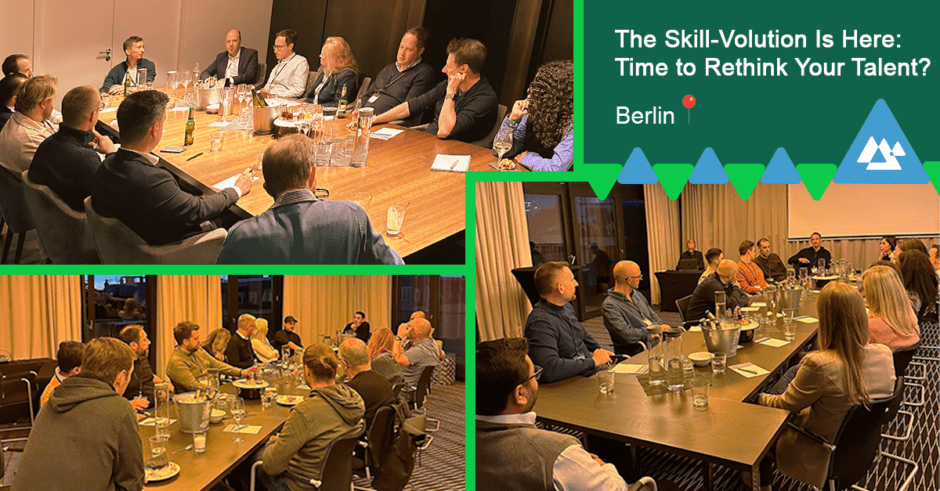The modern organisation is no longer discussing their next hire by the experience on a CV, it’s now on the skills that are needed across an organisation and the skills an individual can bring. How can we start to be more strategic and skills-based?
Annapurna was delighted to recently host a trio of roundtables around the topic ‘The Skill-volution is here: Time to Rethink your Talent?’. The 3 tables represented some of the brightest talents from across Berlin, representing HR, Technology, Go-To-Market and Executive Leaders.
The conversations were attendee-led and hosted by James Ballard (Co-Founder at Annapurna), Joshua Emptage (Director at Annapurna) and Tom Walsh (Manager at Annapurna).
An evolutionary change in the way we hire, train and retain our employees is always going to be a challenge to embed, so we must ensure the journey is collaborative. The conversation brought about the following takeaways:
Redefining Skills and Competencies in Hiring
Before embarking on any change journey, defining the outcomes and reasons behind it are vital. The ‘skills journey’ has become the latest ‘buzz phrase’ across the world of HR and hiring, yet not everyone really understands the impact as of yet.
One of the very early points raised by attendees was around the lack of a definition of ‘skills-based hiring’ and how it is not a one-size-fits-all or plug-and-play. There was even a slightly muted discussion about whether the topic was even fit for purpose in the current climate.
The attendees emphasised the importance of distinguishing the difference between skills and competencies.
Whilst technical skills are essential, soft skills such as resilience, adaptability, and a positive attitude were deemed crucial, particularly for roles that require navigating change.
Can you measure attitude? The group agreed that attitude counts more so than anything. Te people who work best through change are the ones with the correct attitude…can you hire for that?
When looking at a role and what would make something successful in X role, soft skills such as resilience are the most important, yet regularly the ones that don’t get discussed during the hiring process. We must start to put these in line, if not ahead, of the experience/educational-based criteria.
We must start approaching skills assessment holistically as organisations, which will help expand talent pools.
Strategic Workforce Planning with Data and AI
You are only as fast as your slowing moving part.
Effective workforce planning hinges on understanding constraints within an organisation and leveraging updated, relevant data. Across many organisations, there are data accuracy and timeliness gaps, which can hinder strategic planning, especially in tech-heavy roles.
Technology should be the enabler that allows us to manage more data easier. Building workforce planning from data & AI upwards will be achievable but maintaining this will be where the chaos creeps in, which is where technology becomes the solution.
Attendees agreed that AI could revolutionise HR by improving efficiency (e.g., screening CVs), but it must deliver measurable financial benefits to secure buy-in from leadership. We must be putting financial numbers around these initiatives, both at conception and throughout the journey, otherwise, they become a chatter.
Overcoming Challenges in Skill Development
Just because someone doesn’t know something yet, doesn’t necessarily mean that they can’t do it. People also work differently in different scenarios and not all people necessarily want to develop so we must take our people on a journey.
Embedding a culture focused on skill acquisition and internal mobility was highlighted as essential for sustainable growth.
Attendees noted hurdles such as leadership buy-in for job rotation and resistance to skill-based hiring, which can make strategic moves challenging.
Using technology to streamline skill management and broaden candidate profiles was seen as a practical solution, particularly for roles where specific competencies and flexibility are highly valued.
If we can understand what is a skill and what is an attribute and have them aligned with organisational goals, we can be more strategic and start to utilise the real benefits of internal mobility.
Skills will be the currency for years to come for those larger organisations looking to create opportunities internally and understand better the make-up of a future employee. Strategic workforce planning will not be the only solution, it will be a blend of many attributes. Working with concepts such as ontology vs taxonomy, whereby we are not only looking at the skills for a job but also, what blend of skills at what level complement each other, will create a better-rounded organisation for the future.
The evolution of technology is undoubtedly going to be the biggest influence on organisational change but we must be thinking about how quickly we can create impact. When will AI actually start having real effects on effectiveness and efficiency?




